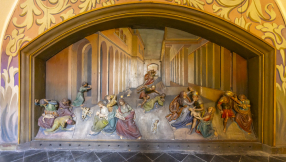The Islamic State ransacked another ancient city at the week. Reports indicate that the Iraqi village of Khorsabad was targeted on Sunday in the latest in a series of attacks on ancient sites.
Iraqi officials are concerned that the terrorists will remove artifacts from the city, which was founded around 720BC.
Khorsabad was the capital of Assyria until the death of King Sargon II, when Nineveh became more prominent. It was largely abandoned after the fall of the Assyrian empire around 605BC, but retained samples of the culture's art and architecture.
A Kurdish official from Mosul, about nine miles from Khorsabad, said the militants began destroying the city on Sunday, and Iraqi Tourism and Antiquities Minister Adel Shirshab reported that the government is investigating.
On Friday, the 3,000-year-old city of Nimrud was destroyed by IS, which UNESCO Director-General Irina Bokova called a "war crime."
"This is yet another attack against the Iraqi people, reminding us that nothing is safe from the cultural cleansing underway in the country," she said in a statement released Friday. "It targets human lives, minorities, and is marked by the systematic destruction of humanity's ancient heritage."
The 2,000-year-old city of Hatra was demolished by the militants on Saturday - another UNESCO world heritage site. The city contained numerous temples and sculptures dedicated to Apollo, Poseidon, and other gods. IS used military equipment to bulldoze the ancient sites.
Last week, the group released a video showing the destruction of artifacts in the Mosul Museum - the second largest museum in the country - and the Mosul Public Library was bombed last month.
More than 10,000 books and 700 rare manuscripts were destroyed in the attack, which was carried out using improvised explosive devices. The museum contained maps and books from the Ottoman Empire, collections of Iraqi newspapers from the 19th century, and other historical items. The militants took over the northern Iraqi city last year, and broke the locks on the library in January.













